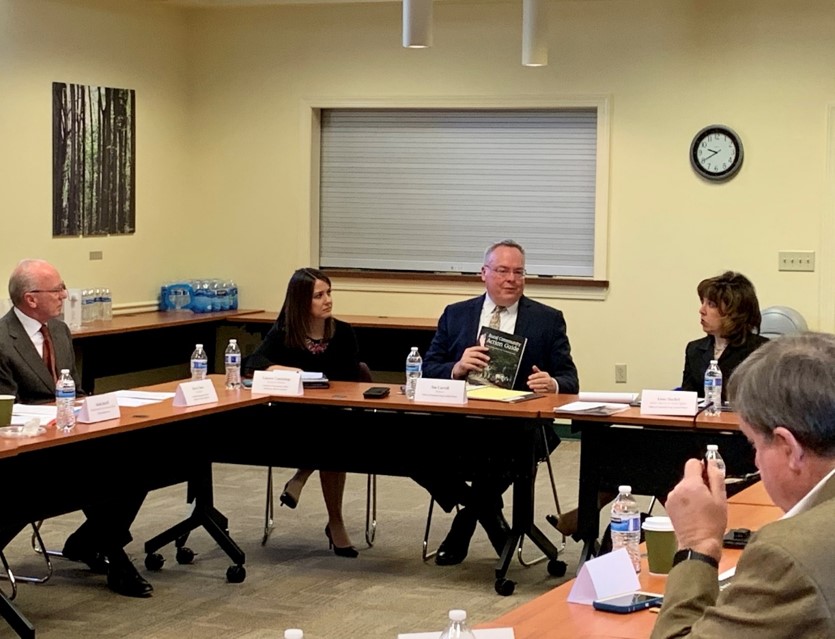The opioid epidemic has disproportionately impacted rural communities.
America’s small towns and cities have seen these drugs tear families apart and cause long-lasting damage. The effect is outsized in rural areas because of fewer health facilities and resources to combat the epidemic.
Rural Community Action Guide
To help small town America, the White House Office of National Drug Control Policy created the “Rural Community Action Guide: Building Stronger, Healthy, Drug-Free Rural Communities” (RCAG). While there is no “one-size-fits-all” solution for communities struggling to address the opioid epidemic, RCAG was designed to serve as a first-step reference for the leaders of rural communities and to share best practices.

Establishing RCAG was a tall order. Thankfully the White House turned to a trusted hand and familiar face to rural America: Anne Hazlett, senior advisor for rural affairs in the White House Office of National Drug Control Policy. Anne brings a wealth of knowledge and experience to the job. She spent two years conducting roundtable discussions with local leadership and rural stakeholders across the country.
The resulting guide provides information on topics ranging from how to address stigma in local communities to how to manage fiscal resources. It advises leadership on how to prevent and treat drug addiction, as well as the role of faith communities, housing and employment as pieces of the solution. The guide also outlines a glossary of important terms that are key in understanding this complex challenge.
Trusted ag collaborations, as well as unexpected partnerships
Separated into chapters contributed by rural stakeholders, RCAG highlights the important role of community partnerships that rural leaders could leverage to build coalitions. For example, the National Farmers Union and the American Farm Bureau Federation recommend encouraging the agricultural community get involved with pre-existing activities, such as drug take-back programs. They also suggest tapping into programs such as 4-H and FFA, which are unique channels available to the agricultural community to educate rural youth on issues, including the dangers of drug addiction.
Another, perhaps unexpected, partnership that RCAG illustrates is with the National Sheriffs’ Association (NSA). NSA explains how rural jails are “revolving doors” for individuals dealing with mental health challenges and substance use disorders. However, jails also provide a controlled environment well-suited to treat medical conditions. Inmates are separated from family responsibilities, close to medical care providers and do not need healthcare coverage for treatments. While rural leadership may not first think to partner with local law enforcement, RCAG demonstrates how this partnership could offer an effective strategy to jumpstart inmates’ journeys to recovery.
While these potential avenues of collaboration may not work everywhere, examples of best practices from rural leaders for rural leaders could be the impetus for an idea that will work in a particular community. “Having tangible examples of what is working on the ground gives people hope that, while this is an overwhelming issue, we can make a difference,” Anne said.
Farm Credit is there to help
As a cooperative, Farm Credit is dedicated to the success and well-being of our customer-owners. Many of our more than 15,000 committed employees are farmers and ranchers themselves, living in the same communities they serve and possessing first-hand experiences of the mental health struggles facing rural communities today.
“While a Farm Credit borrower may have access to mental health sustaining resources, such as transportation to health care, they may employ people on their farms who do not. As employers, Farm Credit borrowers are in a position to be leaders in maintaining a healthy workforce and healthy communities,” Anne said.
Sarah Tyree, vice president of policy and public affairs at CoBank, represented Farm Credit on the task force that created RCAG, in hopes of creating a useful resource for both Farm Credit customers and employees.
CoBank also sponsors “Virtual Living Room,” a program RCAG highlights as a treatment alternative for rural residents. The first Virtual Living Room, located in eastern Kentucky, offers rural veterans a private space in their county library with broadband access that connects them to healthcare professionals at the U.S. Department of Veterans Affairs (VA). Telehealth saves these individuals from the nearly three hour-long drive to the VA hospital in Lexington, while also ensuring reliable access to broadband. A second Virtual Living Room recently opened in Bristol, Vermont.
Hope despite challenges
While the opioid epidemic has overwhelmed rural communities and stretched resources, there is a silver lining. Reflecting on her experiences in the field, Anne said, “I have seen people come together with a mind and a heart for transformation at the local level to create a stronger community for the future.”
To read the RCAG in full and find more information about opioid misuse and resources to address this challenge, visit https://www.usda.gov/topics/opioids.
